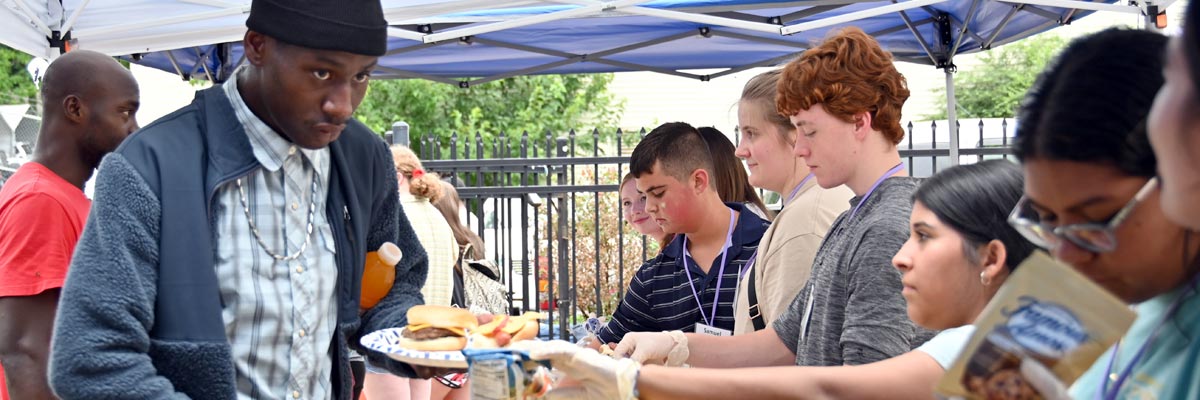Official Website of the
Catholic Diocese of Little Rock
First Sunday of Lent 2017
Published: March 5, 2017
Bishop Anthony B. Taylor preached the following homily during the Women's Religious Discernment Retreat at St. Joseph Center of Arkansas in North Little Rock on Sunday, March 5, 2017.

Bishop Taylor
Many of you have names in your family that have been passed down from generation to generation. In my family that name is Basil. My great-grandfather was Oliver Basil, my grandfather was Basil Clare, his now deceased sister was a religious sister named Sister Mary Basil, my dad is Basil Henry and I am Anthony Basil.
With me this century-long sequence ends. Except now I have a great-nephew named Basil Oliver, so maybe it will start up again with him! A few years ago Sister Mary Basil sent me a card with a quote from St. Basil regarding almsgiving which he regards not only as charity but also as a matter of justice.
It is a perfect message for Lent, but I thought of it especially when preparing for this Mass for you young ladies who are discerning whether the Lord might be calling you to life as a vowed religious like he did my great-aunt years ago.
One of the purposes of Lent is to put us back in touch with our brothers and sisters who are poor. When we fast, we feel in our own bodies the hunger they wake up with every morning. When we abstain from meat and give up desserts, we experience a little of the same austerity that they live with all the time.
St. Basil writes: “The bread which you do not use is the bread of the hungry. The garment hanging in your wardrobe is the garment of him who is naked. The shoes that you do not wear are the shoes of him who is barefoot. The money you keep locked away is the money of the poor. The acts of charity you do not perform are so many injustices you commit.”
St. Basil’s vision is far more radical than what you usually hear priests say about stewardship. According to him, it is immoral to possess a surplus: as long as there are people who lack the things they need, the excess we think we own really belongs to them. St. Basil says that those who hang on to their surplus are really stealing from the poor.
One of the purposes of Lent is to put us back in touch with our brothers and sisters who are poor. When we fast, we feel in our own bodies the hunger they wake up with every morning. When we abstain from meat and give up desserts, we experience a little of the same austerity that they live with all the time. As we accept ashes on our forehead as a reminder of our mortality, we should remember that most people in the world have a much shorter life expectancy than we do.
Our Lenten practices of almsgiving, fasting, prayer and abstinence are for the purpose of softening our hearts so that we will open our hearts to everything the Lord is asking of us, and in particular how he wants us to serve him by helping those who are in need.
You and I have begun another Lent, 40 days that Jesus invites us to spend with him in the desert. Throughout the Bible the desert is a place to encounter God and struggle with demons — we see that in the case of Jesus in today’s Gospel.
It is a place of material deprivation, fasting and hardship. A place to learn how much we depend on God for all those things that St. Basil and Jesus say we should share with the poor: our bread, our clothing, our shoes, our money, our time, our effort, our very life.
In the desert we learn that we don’t own any of these things. They all belong to God, on whom we depend for everything and to whom we will one day have to give account regarding the help we give or fail to give the least of our brothers and sisters.
These 40 days of voluntary deprivation are for the purpose of softening our hearts so that like Jesus, we too will humble ourselves in self-sacrificing service of those whose whole lives are marked by deprivation that is not voluntary. Those for whom God wants to provide through us. This is the heart of a call to religious life in many of our active orders.
Elsewhere in the Scriptures we are taught that our good deeds go before us, that the poor we help in this life will be the ones who welcome us into heaven. They will be our credentials, they will be our character witnesses before the judgment seat of God.
Let us pray that our Lenten sacrifices will indeed soften our hearts and deepen our faith in Jesus, who came to not be served but rather to serve and give his life in ransom for many, poor and rich alike.
Let us also pray that as a consequence of this heart-softening time in the desert, we will then open our hearts to the disadvantaged, whom Jesus loves so much and who are — in a certain sense — our ticket to heaven.





